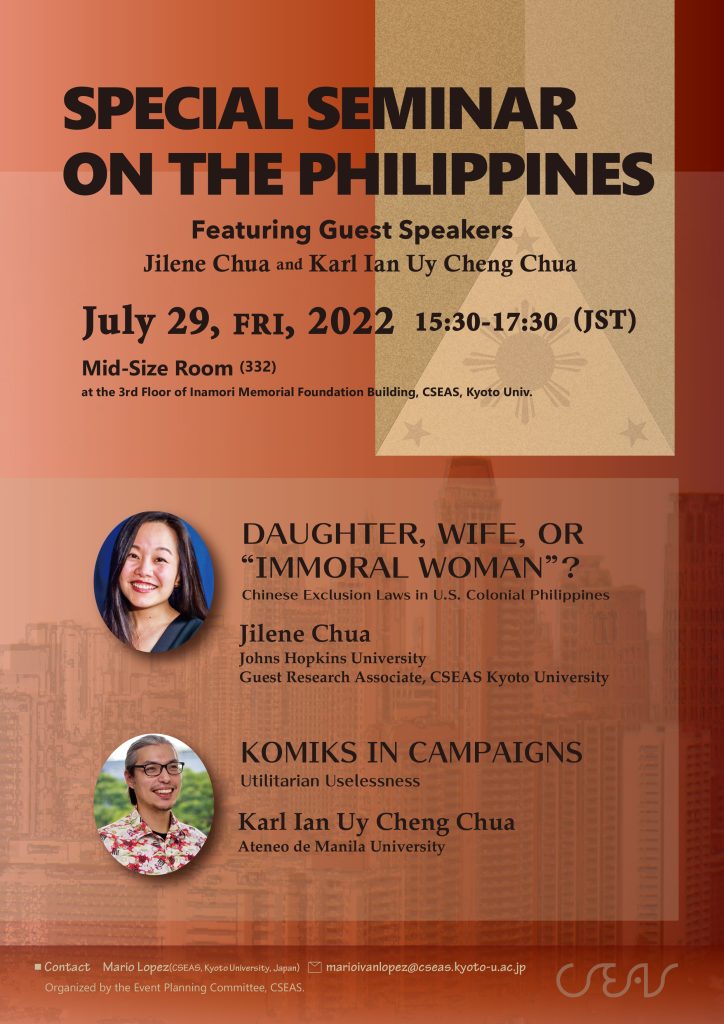Date and Time: July 29, Friday, from 3:30 p.m. to 5:30 p.m.
Venue: Middle-Sized Room (room 332), Inamori Foundation Memorial Building
Center for Southeast Asian Studies (CSEAS), Kyoto University
Daughter, Wife, or “Immoral Woman”?: Chinese Exclusion Laws in U.S. Colonial Philippines
Jilene Chua (Johns Hopkins University, Guest Research Associate, CSEAS Kyoto University)
The shores of California and New York are traditional sites of twentieth-century U.S. immigration history. In 1898, however, the U.S. legal border ceased to map onto a single physical landmass. When faraway islands, such as the Philippines, became subjected to U.S. colonial rule, U.S. immigration restrictions, such as the 1882 Chinese Exclusion Act, governed their ports of entry. Chinese women and girls who sailed to the Philippines confronted this new border. Their stories provide a unique perspective into the imperial and sexual dynamics of U.S. immigration history.
While the U.S. colonial state used Chinese exclusion laws to police “immoral women,” some young women unexpectedly resorted to these same laws to escape prostitution. These insights complicate the ways in which scholars have understood the making of the U.S. border by illustrating the ways in which its development became part of overseas imperial governance.
About the speaker: Jilene Chua is Guest Research Associate at CSEAS Kyoto University. She is a history PhD candidate at Johns Hopkins University. Her interests include socio-cultural legal history, gender/sexuality, Philippine studies, and Asian American history. She is writing a dissertation that examines the ways in which colonial law becomes part of the everyday life of its imperial subjects through a history of U.S. legal colonialism from the perspective of the Chinese in the Philippines. Based on archival materials and oral histories she collected in the U.S. and in the Philippines, this project has been funded by the Fulbright program, the American Society for Legal History, the Society for Historians of American Foreign Relations, among others.
Komiks in Campaigns: Utilitarian Uselessness
Karl Ian Uy Cheng Chua (Ateneo de Manila University)
Until the 2016 Philippine elections, campaign komiks were often ignored despite their extensive use. There were several newspaper articles and opinion pieces featuring the controversy of Karl Comendador illustrating for both Mar Roxas and Rodrigo Duterte. This talk will focus on materials oft ignored in comic and popular culture studies due to the nature of their creation and purpose. Political parties, in attempts to propagate their ideological and political messages, have long used comic books in their political campaigns. [Bratner, Lobinger 2014] However, unlike commercial comics, these campaign comics are often freely distributed and have no intrinsic monetary value. Nonetheless, they are quite interesting to study because they only have a consumptive lifespan of just within the campaign period, thus making the structure and message effective enough for such consumption. This talk will look at campaign komiks in the Philippines and how this form of popular culture media has obscured the concept of weak states in the process of pursuing its purposed agenda.
About the speaker: Karl Ian Uy Cheng Chua is Assistant Professor of the Department of History of the Ateneo de Manila University. He is currently a Research Fellow funded by the Japan Foundation. He is hosted by Hitotsubashi University.
